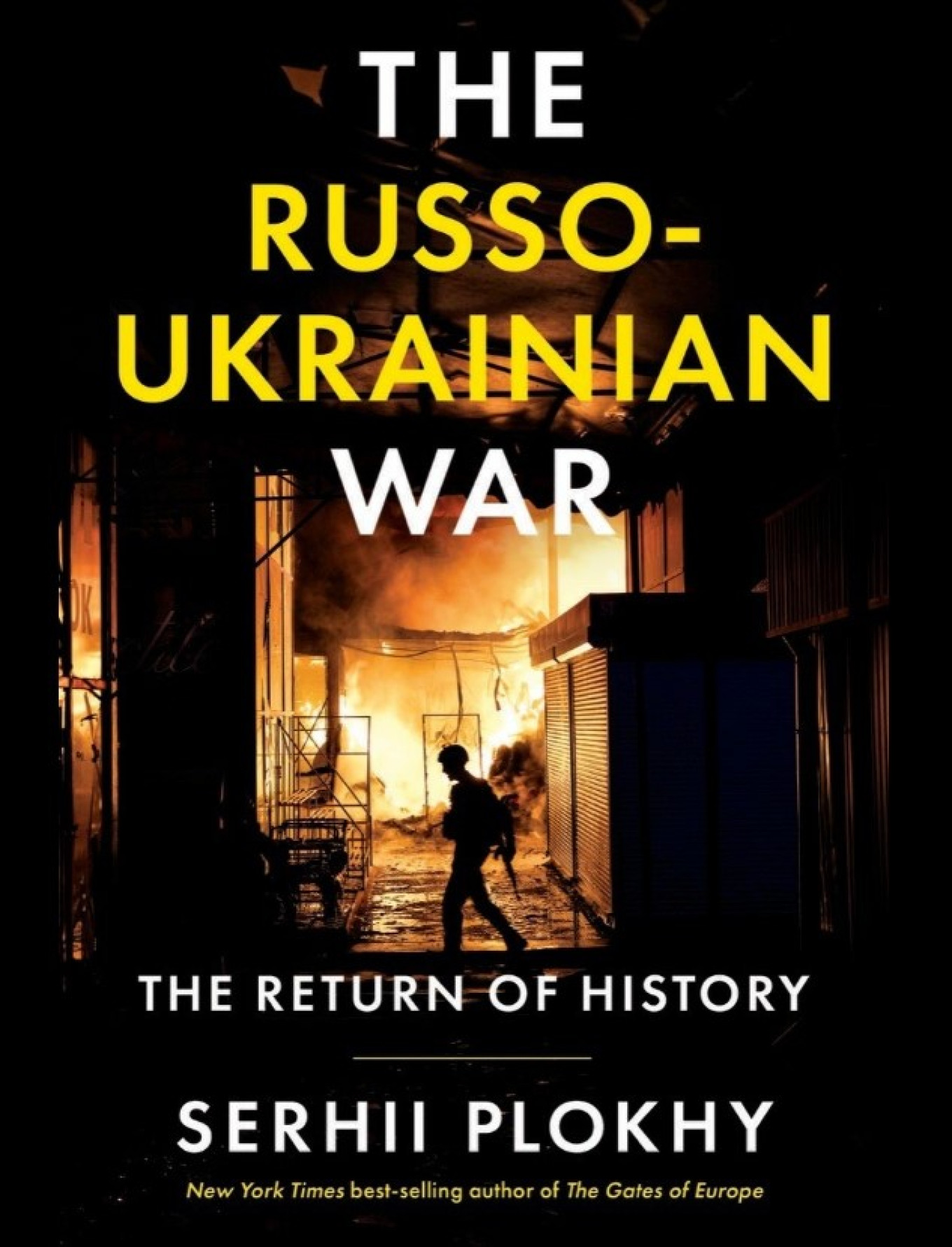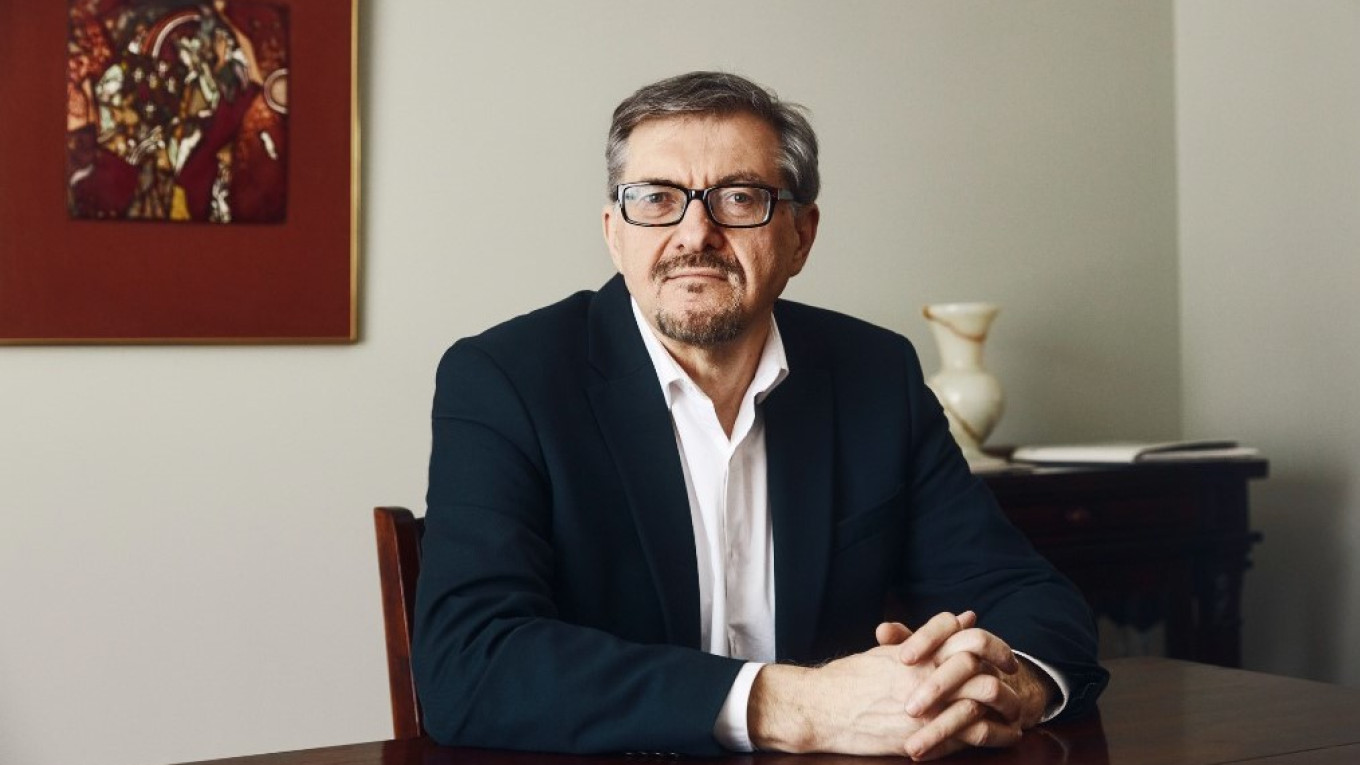Over a year into Russia’s grotesque full-scale invasion of Ukraine, disinformation and misconceptions of the conflict — fuelled both by the Kremlin and by political actors abroad — continued to permeate public debate. "The Russo-Ukrainian War: The Return of History" by Serhii Plokhy takes aim at many of these myths, demonstrating how Russia’s centuries-long imperial obsession with Ukraine created the conditions for Europe’s largest land war since 1945.
In Chapter One, Plokhy lays out his central contention: that the “myth of Russia’s Kyivan origins had already embedded itself in the consciousness of the Russian elites by the late fifteenth century.” The centrality of Ukraine to Russia’s idea of itself, he writes, contributed to the collapse of the Soviet Union: “The role of Ukraine in bringing about the Soviet collapse can hardly be exaggerated. Not only was it a key political actor pushing for Imperial Collapse the dissolution of the USSR, but it also helped to ensure a peaceful disintegration.”
Chapters Two and Three cover the political divergence of Russia and Ukraine — with the former opting for autocracy and the latter for democracy — and the resolution of the first “Crimean crisis” in 1994. “Ukrainian democracy presented a major threat to the Russian political regime,” Plokhy writes, because it emboldened the Russian liberal opposition. In Chapters Four and Six Plokhy takes us through the 2004 Orange Revolution and the 2013/14 Revolution of Dignity, again illustrating how these events threatened Russia’s autocratic regime, and how these events set the stage for the annexation of Crimea and eight years of hybrid war in Donbas.
Chapters Six and Seven address how the annexation of Crimea “made imperialism and nationalism key elements and driving forces of Russia policy.” Plokhy argues that the full-scale invasion “was modeled on the Russian takeover” of the peninsula. In Chapters Nine through 11, he covers the military developments since February 24, 2022, writing that Russia’s strategy has been one of “terror” aimed “break[ing] Ukrainians’ will to resist.” In Chapters 12 and 13, Plokhy zooms out to consider the international implications of the war, such as the renewed strength of ‘the West’ as a geopolitical bloc, and the rise of China as Russia makes its “pivot to Asia.”
For a book of only 299 pages, "The Russo-Ukrainian War" covers a staggering amount of history. In the first 33 pages alone, Plokhy takes us through the war of Ivan the Great with Novgorod in 1471, the rise and fall of the Cossack Hetmanate in the seventeenth and eighteenth centuries, the emergence of the modern Ukrainian national project in the 1840s, the short lived Ukrainian People’s Republic in 1917-18, the entire Soviet period, and a good portion of the 1990s. Plokhy has, throughout his prolific career, devoted whole books to topics that receive only a paragraph of attention in "The Russo-Ukrainian War." Testament to his skill as a historian is his ability to condense and explain these complex historical moments in a way that is accessible for a general reader, while maintaining the clear narrative thread about the centrality of Ukraine to Russia’s imperial imagination.
Amid the macro-level analysis, "The Russo-Ukrainian War" also reminds us of the conflict’s devastating human toll. Interviewing Ukrainian refugees, Plokhy writes of how they “fled the Russian invasion, abandoning all their possessions and trying to save their lives. They were driven out by the fear of death, not by the hardships of war, and often risked their lives in the process.” While many readers may generally be tempted to skip a book’s Afterword, Plokhy’s merits attention because it underscores the human tragedy through his painful account of the deaths, first of one of his readers, Lieutenant Yevhen Olerenko, and then of his cousin, Andriy Khlopov. Recounting how he struggled to find the right words to respond to their tragic deaths, he writes poignantly: “I did not find any, there were none.”
With Plokhy championing the strength of Ukraine’s democratic culture, the vibrance of its past national independence movements, and the strength of its national unity since 2014, "The Russo-Ukrainian War" is unapologetically pro-Ukrainian in its narrative, avoiding any disingenuous attempts to "both sides" the conflict. Much like Plokhy’s previous books, it promises to become a staple for students of Ukrainian history and politics. Its emphasis on the role that a country’s history — real and imagined — has on its relations with other states, as well as its reflections on how Russia’s invasion has created a “new international order” also provides fertile ground for debate for the field of international relations. Underpinned by Plokhy's preeminent knowledge of Ukrainian history, "The Russo-Ukrainian War" paints a masterful portrait of a conflict whose dire consequences have rippled across the world.
The Russo-Ukrainian War: The Return of History

From Chapter 8: The Gates of Kyiv
A telephone poll conducted on February 26–27, the third and the fourth days of the war, showed 79 percent of Ukrainians believing in victory, 90 percent of men expressing readiness to defend their country with arms in hand, and 70 percent of women responding in the same way. In the east, endangered by the Russian advance, 60 percent were prepared to join the army; in the south, the figure was 80 percent. Nationwide, 86 percent of Ukrainians wanted to join the EU, and 76 percent supported plans to join NATO. In early March, with the Russian “blitzkrieg” faltering but no Ukrainian victories in sight, the number of believers in victory jumped to 88 percent. Ninety-eight percent supported the Ukrainian armed forces, and 44 percent were prepared to endure the hardships of war as long as it might take to ensure peace on Ukrainian conditions.
Zelensky’s popularity soared to an unprecedented 93 percent. Support for heads of local administration was next, at 84 percent. This was unprecedented in Ukrainian history. The need to unite around the state authorities was part of the explanation. Even more important was the behavior of government officials in the face of the Russian invasion—not only Zelensky but, with very few exceptions, heads of local administration did not flee and stood with their people. Ukraine had been undergoing a reform of local government devolving greater rights and resources from the center to the localities. Ironically, that reform was the Ukrainian response to Russian demands for the “federalization” of the country. It strengthened the population’s trust in Ukrainian state institutions, which was fully demonstrated in the cities, towns, and villages overrun by Russian forces in the first days and weeks of the war. People marched, carrying Ukrainian flags, in defense of mayors kidnapped by the occupiers.
In the city of Kyiv, nights were full of the sounds of gunfire coming not only from the vicinity of Hostomel, where the fight for the airport was still going on, but also from within the city, where Russian commando units were trying to reach the government compound and centers of military and critical infrastructure but were stopped by defenders. People began to leave the city en masse, but the longest lines were those of men in front of military commissariats enlisting in territorial defense units. Those without military experience were often turned back, but still there were more volunteers than the commissariats could accept and provide with weapons.
Putin’s continuing public responses to Biden’s accusations that the Russian president had promised not to start a war with Ukraine left many officers and soldiers bewildered. Last-minute propaganda efforts to make soldiers believe that the war was being waged to liberate fraternal Russians and Russian speakers were also problematic. Between 35,000 and 40,000 Russian officers and men took part in the Russian army’s unsuccessful attempt to take Kyiv. By the end of March, Moscow had declared unrecoverable losses of more than 1,300 individuals in Ukraine. NATO estimates were closer to 10,000, while the Ukrainians claimed to have killed as many as 20,000 Russians. “Russia has failed in its objective of capturing Kyiv. It has failed in its objective of subjugating Ukraine,” declared the US National Security Council spokesperson, John Kirby, at the time.
Faced with the failure of his plan, Putin blamed others, especially spies, who had been reporting what he wanted to hear. The FSB directorate, headed by General Sergei Beseda, spent millions of dollars recruiting agents and running clandestine networks in preparation for the special operation, but their work came to nothing when the invasion, which the spies themselves probably did not expect to materialize, actually took place. Information on the current status of Ukraine and prospects of its immediate collapse was supplied by highly biased former aides of Viktor Yanukovych, who had fled the country with their boss back in 2014.
In March, rumors circulated in Moscow that Putin had ordered the arrest of generals and officers, who apparently had not only misled him but also embezzled millions of dollars, allegedly to support nonexistent agents and networks but actually spent on apartments, mansions, cars, and vacations. The rumors, if anything, reflected a growing internal struggle at the center of Russian power which pitched the chiefs of the security services against one another.
Excerpted from “The Russo-Ukrainian War: The Return of History,” written by Serhii Plokhy and published by W. W. Norton & Company and Penguin Random House. Copyright © 2023 by Serhii Plokhy. Used by permission. All rights reserved. Footnotes have been removed to ease reading. For more information about the author and this book, see the publishers’ sites here and here.
“The Russo-Ukrainian War: The Return of History” has been shortlisted for this year’s Pushkin House Book Prize, which will be awarded on June 14 in London. Tickets for the ceremony are available here.
An earlier version of this article was published May 21, 2023.
A Message from The Moscow Times:
Dear readers,
We are facing unprecedented challenges. Russia's Prosecutor General's Office has designated The Moscow Times as an "undesirable" organization, criminalizing our work and putting our staff at risk of prosecution. This follows our earlier unjust labeling as a "foreign agent."
These actions are direct attempts to silence independent journalism in Russia. The authorities claim our work "discredits the decisions of the Russian leadership." We see things differently: we strive to provide accurate, unbiased reporting on Russia.
We, the journalists of The Moscow Times, refuse to be silenced. But to continue our work, we need your help.
Your support, no matter how small, makes a world of difference. If you can, please support us monthly starting from just $2. It's quick to set up, and every contribution makes a significant impact.
By supporting The Moscow Times, you're defending open, independent journalism in the face of repression. Thank you for standing with us.
Remind me later.







